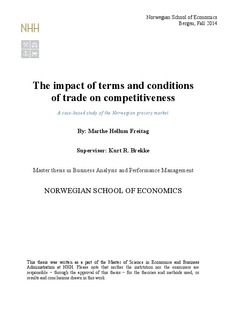The impact of terms and conditions of trade on competitiveness : a case-based study of the Norwegian grocery market
Abstract
The terms and conditions of trade in the Norwegian grocery market are claimed to differ
substantially between the market participants at retail level. Also, the cost of goods sold
constitutes the most significant part of the total costs of the firms. Consequently, the terms
and conditions of trade that a market participant is able to obtain are considered to have
significant impact on its competitiveness. Building on the statements of Ica that their terms
and conditions are substantially worse than those of its competitors and that without
improvements they would have to withdraw from the market, this paper aims at understanding how terms and conditions of trade influence competitiveness at retail level in the Norwegian grocery market. Coop’s recent acquisition of Ica increases the relevance of the research. The research question is answered using a theoretical basis of vertical restraints and buyer power applied on a case study of the Norwegian grocery market with regards to terms and conditions of trade used in the market.
The main findings of the paper are that differences in terms and conditions of trade to a
certain extent make it difficult for market participants to compete. However, the paper
concludes that there are also other factors that affect competitiveness. The conclusions are drawn based on a margin analysis conducted for all four market participants. The analysis shows that Ica has worsened its terms and conditions of trade over the investigated time period, which have made it harder for them to compete. However, Reitangruppen is also found to experience a worsening of its terms and conditions of trade but the firm has still improved its profitability and competitiveness.
